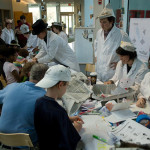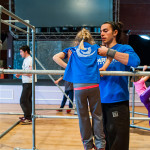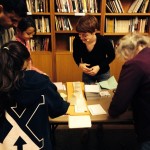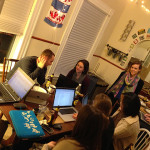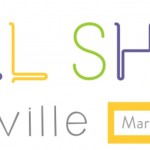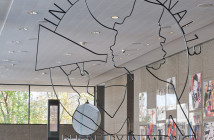Today, with a dedicated organizational team hosting an eclectic lineup of nearly 40 classes taught by enthusiastic educators, and barely a week left until the big day—March 2nd—Massie has a lot to be proud of. The Skillshare team has built a support system in their community, connecting their project with a host of friends, partners, and sponsors including East Somerville Main Streets and Somerville Local First, with in-kind donations from local businesses such as Taza Chocolate and Somerville Brewing Company (Slumbrew). Their Kickstarter campaign was fully funded with donations in excess, within just one week of its launch, and the Eventbrite page has already earned over 600 unique RSVPs.
The event piqued the interest of a community that has given not only their dollars, but also their time, energy, and the passion of their life's work. On this day, volunteer educators will share a piece of their headspace with the community, teaching anything from imaginary mapmaking and business marketing tips for artists to parkour and stock market principles. "Everybody is doing this because they love sharing what they know," Massie insists. "And that is a success in and of itself."
Massie, the Skillshare's Executive Director, and Assistant Director Danielle Freiman spoke with me about the project's previous wins, future challenges, and potential impact on the Somerville community.
The Somerville Skillshare is, above all, rooted in personal interaction. "There are more and more opportunities to learn online—free education courses, MOOCs, and things like that—and this Skillshare is taking the energy of that movement, or that concept of providing free education to as many people as possible, and putting an old school twist on it," Massie explains. "As opposed to being by yourself on a computer and following an online course with thousands of other anonymous people, you're actually showing up to a place in your local community where people are gathering and learning together, and using that as a jumping point for building community." The idea is to place participants in situations with people of different backgrounds and different perspectives, encouraging them to make connections and find inspiration, instead of allowing our community members to further partition into silos.
While the Skillshare is built upon the foundations of these personal interactions, it is imperative that these interactions are not kept within a certain well-educated, artistic, yuppie or hipster audience but extend to the broader Somerville community of immigrants and blue collar workers. East Somerville hosts a vibrant Brazilian, Haitian, and El Salvadoran community, while Union Square is home to a rich diversity of South Korean, Nepalese, and Indian immigrants. Somerville itself has traditionally been settled by blue-collar Irish, Italian, and Portuguese-American families. While the city boasts a somewhat recent reputation of hipsters, creatives, and young professionals, the 2010 Census shows 12.5% of the Somerville population were still living below the poverty line; that is 8.4% of families and 14.3% of residents under age 18. In organizing "community" events, these members of the community must not be forgotten.
Last August, the Boston Globe published an arguably narrow although not entirely unfounded analysis—or judgment perhaps—of hipster culture in a gentrified Somerville, highlighting tensions between locals and the recent influx of 20- and 30-somethings who were apparently to blame for the city becoming "too hip for its own good." Massie, a lifelong Somerville resident (save for a four-year university stint in North Carolina, and a year spent backpacking through Brazil and California), remembers growing up while the city was shedding its "Slummerville" reputation.
"It may be that some parts of town are experiencing this hipster influx, but certainly not the whole town, and it's the aggregate of all these communities that make Somerville great," Massie suggests. "All these people coming into Somerville are frequenting local businesses and they're bringing in new businesses, and all that has been really good for the city... With that being said, this conversation touches on a lot of the issues of gentrification—and I'm not going to pretend I have the answers in that area—but we need to keep [our locals and current residents]a priority while cultivating and encouraging new people to come in."
As the Skillshare currently exists and as a result of bootstrap outreach efforts primarily through word of mouth, social media, and list serve blasts, Massie and Freiman recognize participants may only be a distinct segment of the Somerville community. At a glance, its teachers generally skew towards a younger, White, highly educated, and middle class or higher demographic. This is an issue the organizers are considering for possible future iterations of the Skillshare, as perhaps this segment does not reflect the authentic make-up of the Somerville community.
Though events like the Skillshare are produced for the public, we quickly realize that this "public" is largely fragmented. To turn a blind eye to the segments the Skillshare lacks would be an irresponsible oversight. It is highly commendable, however, that the Skillshare classes are inherently diverse and divergent in content. The dissociative nature of the event segments the public by interest, skill set, and knowledge base. It promotes a gathering of exponentially individualistic identities and interests by combining non-parallel experiences if only for an hour-long class. The Skillshare highlights and truly celebrates these public fractures—eclectic parts of a community "whole" which will never truly exist, because its diversity is in perpetual flux.
Massie admits, "I realized we have an opportunity to actually shape a direction of the city in a very small, very niche way." With that opportunity comes a responsibility to see the negative space—the population and issues in our community that are underserved and overlooked. The Skillshare itself becomes about much more than the content of its classes. It is about the personal interactions that are the fabric of a community.
"By doing this, by hosting this Skillshare in Somerville where it hasn't happened before, we are giving local residents another opportunity upon the other opportunities that already exist to be with each other, to learn from each other, and to hopefully take those skills that they learn at the event to do things within their community that help to either advance their own creative development or the creative development of their Somerville community," Freiman explains.
"If the Skillshare is something that becomes known as one of the many things along with spaces like Artisan's Asylum, Vernon Street Studios, Somerville Arts Council, Mudflat Studio in East Somerville... and all these places that draw people in and make them feel like this city is a place they want to be a part of, then I'd be really proud of that result," Massie adds. The Skillshare, among a variety of other opportunities in Somerville, is already drawing the attention of artists who have chosen to relocate to this city to be a part of its creative community.
Success in the Skillshare team's eyes will not be the cumulation of their efforts in a day's work this coming weekend. "I don't think it's going to end here," Freiman muses. "If people go, or even if people don't go, I hope there will be support online... like 'let's get something started for a monthly program'." Just as learning does not stop with graduation from university and community is not limited to our social silos, the generous spirit of the Somerville Skillshare will not end with the event itself. We have already seen the community rise to support Massie, Freiman, and their team's collaborative efforts. Beyond March 2nd, after the mapmakers meet the stock market analysts and sparks and dialogue fly, who knows what opportunities the Somerville community will empower next.
The Somerville Skillshare will be held this Sunday, March 2nd, 12-6pm at the Center for the Arts at the Armory, located at 191 Highland Avenue in Somerville. Throughout the day, attendees can choose to participate in nearly 40 free drop-in classes, taught and organized by Somerville residents. For more information, visit somervilleskillshare.org or email somervilleskillshare@gmail.com.
Editor's Note:
After publication, Massie alerted us that he credits the Brooklyn Skillshare with inspiring the "skillshare" structure. He cites the Brooklyn Skillshare as an influence and guide to the Somerville Skillshare.






